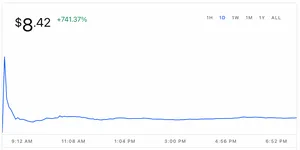Arthur_0x wrote on Twitter that they had previously only ever used a hardware wallet on their PC, but when they started more regularly trading NFTs they'd started using a hot wallet. "Hot wallet on mobile phone is indeed not safe enough", they wrote on Twitter, "Guess no more hot wallet usage then." They also wrote, "The only thing I can say to the hacker is: you mess with the wrong person" and tweeted the wallet address to which the NFTs were being transferred, asking for it to be blocklisted.
Hacker steals more than $1.5 million after compromising wallets belonging to crypto whale Arthur_0x
- Tweet by Arthur_0x
- Tweet by Arthur_0x
- Attacker wallet on Etherscan
Hacker steals $1.45 million from OneRing Finance using code that self-destructs after the attack
The hacker complicated things somewhat for OneRing by covering their tracks. They used a "self-destruct" mechanism — typically used by developers to destroy smart contracts that are found to have a bug — to destroy the contract they used to carry out the attack, making it more difficult for OneRing to determine which parts of their codebase were vulnerable and led to the attack.
- "OneRing Finance exploit. Post-mortem — After OShare Hack.", OneRing Finance blog
- Tweet thread by PeckShield
NFT scammers take over the Twitter account of a Florida gubernatorial candidate
The Fried account compromise is only one instance of what has become a trend on Twitter: Twitter accounts belonging to high-profile individuals, or accounts that are verified or have a large number of followers, being compromised and sold to NFT scammers. On March 11, ESPN baseball reporter Jeff Passan also had his twitter account compromised and repurposed to shill Skulltoons NFTs. Skulltoons distanced themselves from that incident, writing that they believed the hackers were trying to scam their NFT community.
- "Hackers hijack Nikki Fried’s campaign Twitter account", Florida Politics
Kaiju Kongz NFT project artificially inflates its floor price by destroying your NFTs if you list them for sale at too low a price
Some NFT collectors criticized the choice. One described it as "illegal market manipulation tactics", and others said the project should grow the floor "organically". Given the rampant manipulation in the NFT space, one wonders if the real criticism collectors have with the project is that they were too transparent about their price manipulation, and should've just done it quietly like other projects have.
Founder of crypto investment scheme "IGObit" and the sham organization "World Sports Alliance" is convicted of wire fraud
- "President Of Sham United Nations Affiliate Convicted Of Cryptocurrency Scheme", U.S. Attorney’s Office, Southern District of New York
People briefly borrow Bored Ape NFTs to claim as much as $1.1 million in $APE tokens
People were somewhat split on whether this could be classed as a vulnerability in the $APE airdrop, since (as with many crypto hacks and scams) the person was operating completely within the rules set out in code.
Australian regulatory agency begins lawsuit against Facebook over failing to address scammy crypto ads
- "ACCC takes action over alleged misleading conduct by Meta for publishing scam celebrity crypto ads on Facebook", Australian Competition & Consumer Commission
Binance says it will stop operating in Ontario, for real this time, and admits they lied to investors
On March 16, Binance confirmed that they would actually stop servicing Ontario residents, for real this time. They also admitted to sending an email to investors on January 1 that said that they could no longer trade or onboard to the platform, despite not putting any such restriction in place.
- "Binance tells regulators it will cease operations in Ontario... for real this time", Cointelegraph
- "Binance is not registered in Ontario", Ontario Securities Commission
Discord hack targeting Rare Bears NFT project nets attacker $800,000
Not only did the attackers post a fake mint link, they took steps to prevent the project from thwarting their attack by banning other members and removing user rights that would have allowed other project members to delete the fake links. They also added a bot to the server that locked channels so people couldn't send warnings that the links were fake.
The Rare Bears team did eventually regain access and secured their Discord server. In an apology posted on their Twitter page, they addressed the multiple security breaches that Rare Bears have faced to date, and said they had "stepped up" and would be having a firm audit their project.
Bored Ape Yacht Club launches their new ApeCoin, which immediately tanks in price
The $APE price briefly soared to around $40 shortly after launch, before crashing precipitously to around $8.50 not long after, presumably as people cashed out their free money. Even many cryptocurrency enthusiasts were nonplussed by the launch, with many describing it as a "money grab" or an attempt to enrich the founders, which apparently is a bad thing (despite many crypto projects openly doing the same). One angry Redditor wrote, "Owners of Bored Ape NFTs were given the coin first(very rich people), then it was sold to the normies who got FOMO and pumped the price, then it crashed. Yet again, leaving regular people holding bags of pure garbage while the coin pushers wave bye-bye from their lambos."
- "Everybody Is Mad About 'ApeCoin'", Vice
- "This APE fiasco is just about getting the founders rich" from r/CryptoCurrency
- Tweet by kevwuzy








